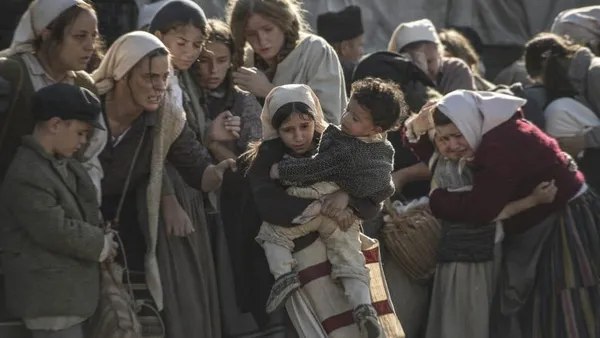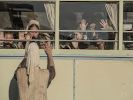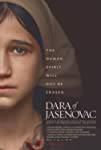Eye For Film >> Movies >> Dara Of Jasenovac (2020) Film Review
Dara Of Jasenovac
Reviewed by: Jennie Kermode

If you are left alone, the children are told, remember your names and where you are from.
We never see where Dara is from. When we meet her she's already on the road, surrounded by family members and fellow villagers, being marched along to the railways station by uniformed men with guns. She doesn't really understand what's happening and unlike the adults, she doesn't pretend to. She does know that keeping quiet and doing what she's told is, at least for the meantime, her best hope of survival.

Exactly how many people were killed in the concentration camps at Jasenovac (the only ones in the Second World War run not by Nazis but by Croat Ustaše, who were actually criticised by the Nazis for their brutality) - remains a subject of controversy to this day, but even the lowest estimates put it at around 57,000. The victims included Jews, Roma people and Orthodox Christians like Dara, who learns early on that what differentiates 'them' from 'us' is the order of the hand movements used to make the sign of the cross. This is all she knows when her father is taken from her, when she loses her oldest brother, and when her mother is killed. By the time she arrives at the camp where she will spend most of her time as an internee, the only person she has left is her youngest brother, who is almost two, and she is desperate to protect him no matter what it takes.
In the camps, being ten, and emotionally mature for her age, makes Dara fit to serve as a carer for other children whilst the adult women in her group are taken out into the fields to do forced labour. She will find herself taking on many more responsibilities before her story is done, but for the most part she is an observer. The film was executive produced by historian Michael Berenbaum and uses this device to present a catalogue of horrors recalled by those who survived the camps. There's a significant focus on women as perpetrators, something which tends to be overlooked elsewhere. From time to time, we also see events from the perspective of Dara's father, who is kept elsewhere and put to work removing valuables from the bodies of dead civilians before throwing the bodies into the nearby river.
Dara's stoicism in the face of what she witnesses provides a quiet source of inspiration for fellow prisoners, though the film never focuses too heavily on this and avoids overt emotional manipulation. Sometimes her limited understanding spares her some of the horror without rendering it invisible to the viewer. Biljana Cekic is well chosen for the role, diffident but forceful when she needs to be. Among the other actors, Marko Janketic stands out as the vicious camp commander Maks Luburic.
Given the nature of the story, characters come and go. The general standard of the acting is high, the children natural. The film has been handsomely produced with a lot of attention to detail, from the set design and costumes to the photography and soundscape. Rather than focusing on drab and desolate imagery as similar films have done, this one frequently presents us with atrocities taking place in bright daylight in rural landscapes which seem both too beautiful and too humble to contain them. In one scene, murder is ritualised as part of a game. In another, the children play a game of hide and seek - innocent at first, until one realises that it's about teaching them skills which their lives might depend on.
To date, cinema has rarely touched on the deeds of the Ustaše. This is an impressive attempt to tackle the subject head on, taking in multiple issues without overloading the viewer. Hopes that it will initiate a much wider cultural conversation might yet by stymied by arguments over its authenticity and claims that it is intended to function as propaganda - yet whilst the Serbian government may have had political motives for supporting the production, historians generally agree that the events it depicts are real, and that children were among those killed in the camps. The bitterness - in both directions - that surrounds the release only emphasises the importance of further cultural engagement. The alternative being all too clear.
Reviewed on: 09 Feb 2021

















